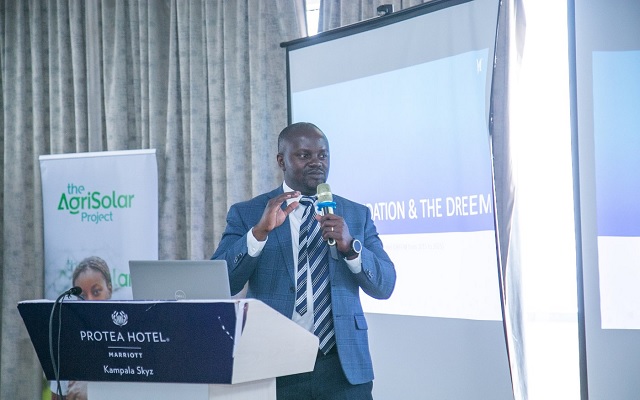
Kampala, Uganda | JULIUS BUSINGE | Mott Foundation has announced that it will soon unveil a USD$3 million initiative known as DREEM (Distributed Renewable Energy Ecosystem Model) for ecosystem builders within the AgriSolar economy.
Speaking at an AgriSolar stakeholder workshop organized by the Innovation Village in Kampala on Oct.4, Robert Ddamulira, Program Officer for Advancing Climate Change Solutions (ACCS) at the Mott Foundation, highlighted the foundation’s commitment to harnessing solar energy for productive purposes in the agricultural sector in Uganda.
“The DREEM hub will adopt a collaborative, multi-stakeholder approach to address critical energy access challenges, including limited technical expertise, a shortage of local entrepreneurs, restricted financial services, poor coordination, and ultimately, the impact on community livelihoods resulting from energy access initiatives,” Ddamulira said.
Whereas there is a heightened sense of urgency for innovation in climate change, Ddamulira said, it is crucial that we become deliberate in ways that support the adoption and usage of solar technology by maximizing opportunities in the demand and supply chain that streamline the development, deployment, financing, sale, maintenance, and other aspects of consuming solar technologies for smallholder farmers.
Arthur Mukembo, the Lead Future Lab Studios said, DREEM is one of the efforts in place aimed at creating an enabling environment where solar innovators can thrive, scale their ventures, and contribute significantly to Uganda’s sustainable energy and agricultural future.
Mukembo said addressing financing bottlenecks would boost innovations and uptake of solar technologies in key agricultural value chains and related sectors.
Uganda is on the verge of adopting the renewable energy revolution to reduce its dependence on fossil fuels.
The country according to the Renewable Energy Policy 2013 has a solar electricity potential of about 200MW, 1650MW from biomass, 800MW from peat, 2200MW from hydropower stations, and 400MW from geothermal energy.
More than two-thirds of Ugandans rely on agriculture for their livelihood –thus solar-powered irrigation support comes in handy.
 The Independent Uganda: You get the Truth we Pay the Price
The Independent Uganda: You get the Truth we Pay the Price



